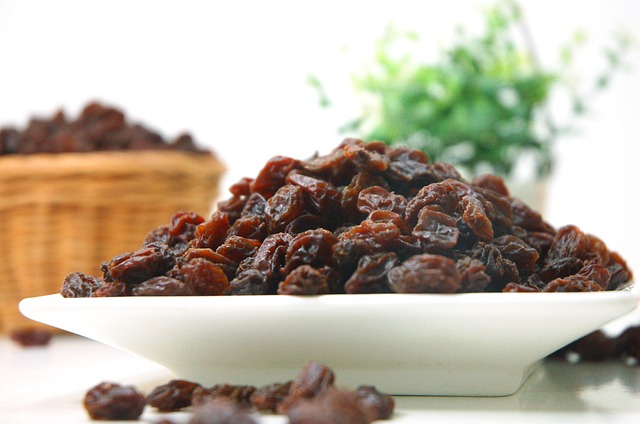
Raisins, the dried grapes that are a popular snack among humans, often raise questions about their safety for pets, particularly dogs. Thus, many ask the question of “can dogs eat raisins?”. Raisins are toxic to dogs, and for pet owners who are mindful of their furry companions’ health and diet, they should know the risks and dangers associated with raisins for dogs and avoid feeding them to their pets.
Table of Contents
Why Are Raisins Dangerous for Dogs to Eat?
The answer to the question of “can dogs eat raisins?” is no for very important reasons. Raisins, and grapes, are very dangerous to dogs because they can cause acute kidney failure, which is a condition where the kidneys suddenly stop functioning correctly. Even a small amount can be harmful, and the exact toxic dose varies widely between every dog. The precise reason as to why raisins and grapes are toxic to dogs remains largely unknown, as the toxic compound within them has not yet been firmly identified, despite vigorous research.
How Many Raisins Can Dogs Eat Before Getting Sick?
The exact number of raisins that can cause toxicity in dogs is highly variable, making it one of the most complicated aspects of raisin and grape toxicity. Some dogs may become severely ill from ingesting just a few raisins, while others might consume a bit more without showing immediate signs of distress. Given this unpredictability and the lack of a concretely defined safe threshold, veterinarians universally recommend keeping raisins (and grapes) completely off-limits to dogs to avoid the risk of kidney failure or other severe health issues.
Symptoms of Raisin Toxicity
The symptoms of grape and raisin poisoning in dogs can vary as the toxicity does not seem to correspond to a certain breed, sex, or age of dogs. This unpredictability makes raisins particularly dangerous, as it is very difficult to predict how every dog will react to them. Raisin toxicity in dogs can manifest a range of symptoms, which may vary in severity depending on the quantity of raisins ingested and the individual dog’s sensitivity.
Here’s a list of common symptoms:
- Vomiting: Often one of the first signs and can occur within a few hours of ingestion.
- Diarrhea: Dogs may experience diarrhea, which can also occur quickly after they have eaten raisins.
- Lethargy: Dogs may appear unusually tired, weak, or show a lack of interest in usual activities.
- Loss of Appetite: Dogs might show less interest in food or refuse to eat.
- Abdominal Pain: Discomfort or pain in the stomach area; dogs may react negatively to their stomach being touched.
- Increased Thirst: Dogs may develop excessive thirst and drink more water than normal.
- Increased Urination: Initially, there may be an increase in urination as the body tries to eliminate toxins.
- Dehydration: Dogs may still become dehydrated, which can be characterized by dry gums and nose, sunken eyes, and decreased skin elasticity.
- Decreased Urination: As kidney damage progresses, urination frequency may decrease greatly, which is a serious sign indicating potential kidney failure.
- Bad Breath: A result of toxin buildup in the bloodstream that the kidneys can’t filter out.
These symptoms can develop within hours of ingestion, and their severity can escalate fast. It’s crucial to seek veterinary attention immediately if your dog shows any signs of raisin toxicity, as early and aggressive treatment can significantly improve the prognosis.

What if a Dog Already Ate Raisins?
If you suspect your dog has ingested raisins, it’s crucial to act immediately. Contact your vet or an emergency animal hospital right away. Do not wait for symptoms or severe signs of poisoning to appear; early intervention is key to preventing more severe outcomes.
There is no specific antidote for grape or raisin toxicosis. Treatment will often focus on decontamination by inducing vomiting and administering activated charcoal to absorb remaining toxins in the intestines, fluids will likely be given to support kidney function and possibly medicine to protect the kidneys, along with close monitoring of kidney function. The prognosis depends on the amount ingested, the speed of treatment, and the individual dog’s response. Early and aggressive treatment can improve the chances of a successful recovery.
Prevention and Safety Measures
Prevention is straightforward: keep raisins and grapes out of reach of your pets. Be mindful of foods that might have these fruits as ingredients, such as fruit salads, cereals, and baked goods. Ensuring that everyone in the household, including children, is aware of the dangers of feeding these fruits to dogs is also important.
In conclusion, raisins are a definite no for dogs due to their potential to cause acute kidney failure. The lack of a known toxic dose and the unpredictability of dogs’ reactions make it essential to avoid feeding raisins to dogs altogether. If an incident occurs, immediate veterinary attention is vital. As responsible pet owners, our role is to ensure the safety and well-being of our furry friends by keeping hazardous foods away from them and being informed about the risks some human foods pose to them.
FAQ
Can Dogs Eat Grapes?
No, dogs can not eat grapes or any grape varieties as they are extremely toxic for them, just like raisins. Avoid feeding grapes, raisins, and currants to your dogs because if they ingest even a very small amount of these, the health issues it can cause could be extremely dangerous and even fatal.
Can Dogs Eat Raisin Bran?
No, dogs cannot eat raisin bran cereal, raisin bagels, trail mix, or any other kind of food or baked goods that contains raisins in them. This is because the amount of raisins that a dog can eat before getting sick is undetermined, and it could be as little as just one before extreme health issues occur. Thus, to be safe, avoid feeding your pet any raisin or grape related foods.
Is Grape Juice Toxic to Dogs?
Grape juice, like other grape and raisin related foods, is harmful to dogs. Avoid feeding your dog grape juice and all types of grapes and grape-flavoured snacks as even just a small amount could have seriously dangerous effects on your pup’s well-being.
Want to know more about what can dogs eat? Check out these similar articles:


